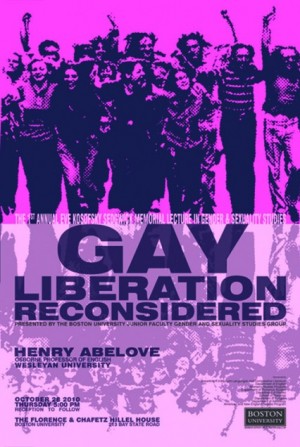
On Thursday October 28, Professor Henry Abelove of Wesleyan University gave a lecture entitled “Gay Liberation Reconsidered” to about 50 students and faculty at the Hillel House. Professor Abelove, who bowed his bald head toward the microphone so his soft but enthusiastic voice could be heard to the back rows, delivered the First Annual Eve Kosofsky Sedgwic Memorial Lecture in Gender and Sexuality Studies.
Although the audience was made up of faculty within gender studies who may not have been surprised by the information given, many students attended and eagerly learned about a topic not always discussed in such public discourse.
“I felt that Professor Abelove’s talk was not only interesting, but eye opening,” said COM sophomore Brittney McNamara.
“He highlighted both the pros and cons of the Liberationist movement, which sparked further thought about Gay Rights as a whole.”
Many people are aware of the Gay Rights movements that push for equality in institutions such as marriage and the military, but Abelove explained the Gay Liberation movement that emerged after the Stonewall Riot in 1969, but was soon overshadowed by the more popular approaches.
The Stonewall Inn was a gay bar in New York City that made history on June 28th and 29th in 1969 when policed raided the establishment at about 3 am. The customers rioted against this intrusion and set the spark for popular movements in the homosexual community. While not denying or condemning this aggressive reaction, Abelove’s thesis was that “the Stonewall story eclipsed every aspect of gay liberation except it’s willingness to fight back.”
But there is much more to this movement that a majority of the public aren’t given the opportunity to know. Although it was somewhat more geared towards those studying sexuality, Vaughn Watson, another student who attended, explained that “Abelove’s brief overviews of the tenets of the homophile and liberationist movements would have brought someone not in the know up to speed.”
Most people are familiar with what Abelove called the “citizenship story,” where gay activists work towards gaining rights associated with being an American citizen, but a key movement is ignored in favor of this less aggressive movement. Shortly after Stonewall, the Gay Liberation Front formed to assert their beliefs that equality could not be achieved through gaining acceptance within these systems; they valued democracy strongly and thought the American system wasn’t an “adequate” venue in which to conduct their actions.
Liberationists transformed the three pillars of democracy to fit their needs: equality as a global requirement, not a social conformity, liberty expanded to liberation with commitment to coming out, not as an affirmation of gay identity but to publicize their political activism, and fraternity to a deepened, even eroticized extent and a connection to prisoners and convicts through literal and metaphorical shared experiences of constraint. Abelove explained their ideology of working outside the system by giving the example that they would agree that homosexuals should be allowed to serve in the military, but if they were to be drafted, they should refuse to go.
Abelove, while not discounting gay activism through American institutions, used the talk to highlight a movement that he felt shouldn’t have been smothered as quickly as it was. He ended the talk by saying that Liberationists still persist as a subterranean influence in LGBT circles (lesbian, gay, transgender and bisexual), but we need to stop ignoring the complex mental world to decide our own view of this ‘radical’ movement.
“Liberationists were unpersuaded,” ended Abelove, “will we be persuaded?”
A reception followed the talk, allowing both students and faculty to engage in discussion. Watson, noted that he was actually shocked by how many students attended, and a few teachers mentioned how pleasing this was during the post-discussion.
“As one of the founders of Q, a queer activist collective on campus, I found the amount of people there and the interest that they showed throughout the lecture and the Q&A reassuring,” said Watson. “It isn’t often that you see such interest in LGBTQ history and activism.”

One Comment on ““Gay Liberation Reconsidered” Lecture Informs and Inspires Students”